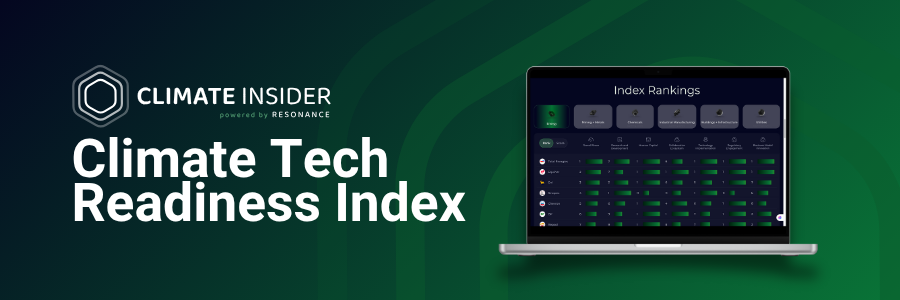As part of a research project on predictions for climate tech investment trends in 2024, Climate Insider spoke to investors including Craig Douglas from the World Fund, Pauline Wink from 4impact Capital, Desirée Pettersson and Romain Diaz from Satgana. All investors shared the prediction that the climate tech market is poised for continued growth in 2024. Climate tech companies are expected to outperform other verticals in the venture capital market, driven by global climate change awareness. Key trends include a focus on the energy sector, tighter regulations against greenwashing, and a shift towards diversified investments.
Craig Douglas (World Fund)
Climate Insider spoke with Craig Douglas, Founding Partner at World Fund, to hear his thoughts on climate tech investments trends in 2024. Craig predicted “continued growth of the market in 2024 with larger growth rounds and additional infrastructure spending.” According to Craig, market growth in climate tech is expected to manifest through larger growth rounds, indicating that companies in the climate tech sector are likely to secure substantial funding to support their expansion and development efforts. Moreover, the mention of additional infrastructure spending suggests that there will be increased investment directed towards building and enhancing the necessary physical and technological foundations for climate tech solutions.
Craig further predicted, “A potential normalising of valuations after 2 years of high prices in the Seed and Series A area, but there is a lot of dry powder here so I expect the number of investments to continue to be high.” The normalisation suggests a return to more typical or reasonable valuation levels after a period of elevated prices, which might have been driven by increased demand or enthusiasm for climate tech investments. Despite this potential adjustment, Craig notes the presence of “a lot of dry powder,” indicating a significant amount of available capital for investment. As a result, the expectation is that, even with the normalisation of valuations, the overall number of investments is likely to remain high.

Pauline Wink (4impact Capital)
Pauline Wink, General Partner at 4impact Capital in Hague, also contributed significantly to the discussion. Pauline also remained optimistic about climate tech investment growth in 2024, “As VC markets have been slowing down worldwide, climate tech companies have relatively outperformed other verticals with significant numbers over the past year and given the rising awareness of global climate change, we expect this trend to continue.”
Further, when considering different sectors, Pauline predicted growth and developments particularly in the energy space. “With nations collectively embracing renewable energy and electric transportation, there is an emerging need for tools that help orchestrating on- and off-loading to the grid cleverly,” said Pauline. The key insight is the emerging need for innovative tools that can effectively manage the integration and disconnection of energy sources to and from the grid. Therefore, the emphasis is on the development of intelligent solutions that can cleverly coordinate the flow of energy onto and off the grid, ensuring efficiency, stability, and optimal utilisation of renewable resources. This prediction aligns with the growing importance of smart grid technologies and management tools in the context of the broader transition to cleaner and more sustainable energy practices worldwide.
“We also see regulations with regard to greenwashing becoming more strict and we expect that this will increase the demand for higher quality and transparency of ESG- or carbon MRV-solutions in 2024 too,” said Pauline. In response to these anticipated regulatory changes, Pauline expects an increase in demand for higher quality and more transparent Environmental, Social, and Governance (ESG) or carbon Measurement, Reporting, and Verification (MRV) solutions in 2024. This implies a growing need for reliable and accurate tools that can assess and verify a company’s environmental and sustainability claims. As regulations become more stringent, businesses are likely to seek robust ESG and carbon MRV solutions to ensure compliance and demonstrate genuine commitment to sustainability practices. This aligns with a broader trend in corporate responsibility and transparency within the context of environmental impact.
Desirée Pettersson & Romain Diaz (Satgana)
Climate Insider also spoke to two investment professionals, Romain Diaz (Founder and CEO) and Desirée Pettersson (Investment Analyst) from Satgana, an early-stage climate tech venture capital firm based in Luxembourg City. Their outlook on climate tech developments in 2024 remained positive, and they had predictions around emissions reduction potential, climate tech diversification and measurement and data. Romain and Desirée highlighted several key trends and shifts in the climate tech investment landscape:
- Emissions Reduction Potential (ERP) increasingly influencing investment decisions:
(Hopefully) More capital flowing to Climate Tech solutions in difficult-to-abate sectors with high emission intensities. In order words, we expect investors to be increasingly drawn to solutions that are must-haves, rather than nice-to-haves, from a climate point of view, therefore considering the capability of a technology to decarbonize a sector if successfully scaled. - Maturity Matters: Investors prioritising solutions delivering emission reductions within a reasonable time horizon – i.e. more capital flowing to proven technologies at the onset of commercialization rather than infant technologies in the lab-phase . This inclination is likely to be driven by two main factors; reducing risk and prioritising emission reductions that can take place in the near future.
- Climate Tech Diversification: In contrast to 2021 and 2022, when investors flocked around startups in the mobility sector, 2024 will most likely see a diversification of investments as more investors move away from saturated markets and pursue opportunities that have been underfunded to date.
- Measurement and Data: Deep Tech innovations that are able to collect, integrate and analyse data (be it environmental, risk or financial) will become increasingly important to a wide range of stakeholders to make informed decisions, comply with regulation, and optimise decarbonization efforts.
Investors are expected to prioritise mature technologies at the commercialization stage, reducing risk and seeking near-term emission reductions. Additionally, a forecasted diversification of investments away from saturated markets, such as mobility, and the increasing significance of data-driven Deep Tech innovations highlight the evolving landscape for climate tech investments in 2024.
The consensus among the investors points towards a positive outlook for climate tech investment trends in 2024. Anticipated continued growth in the market, a shift towards mature technologies, and a focus on emissions reduction potential highlight the sector’s resilience and potential impact. The predictions also suggest a diversification of investments, particularly in response to changing market dynamics, regulations, and the growing importance of data-driven innovations in climate tech. Overall, the climate tech landscape is expected to thrive amidst global climate change awareness and evolving investment strategies.
To stay informed about the climate industry explore our latest climate tech news.
Featured Image: Credit: Axios








